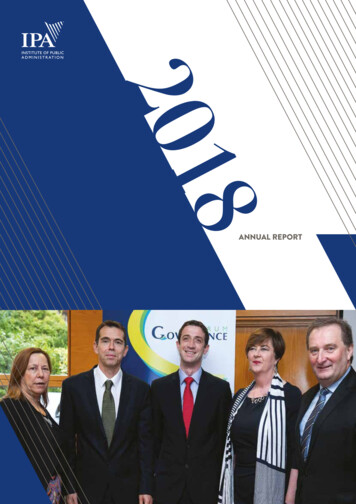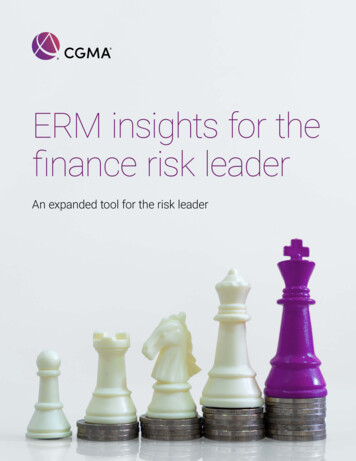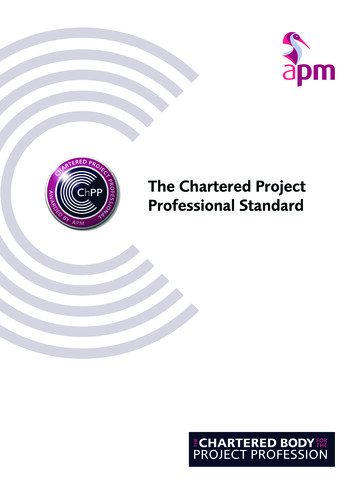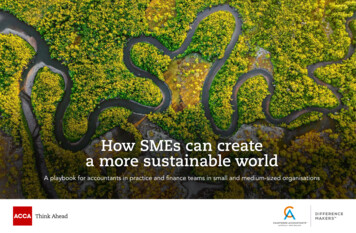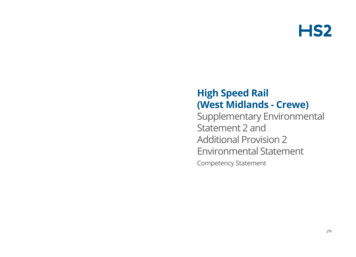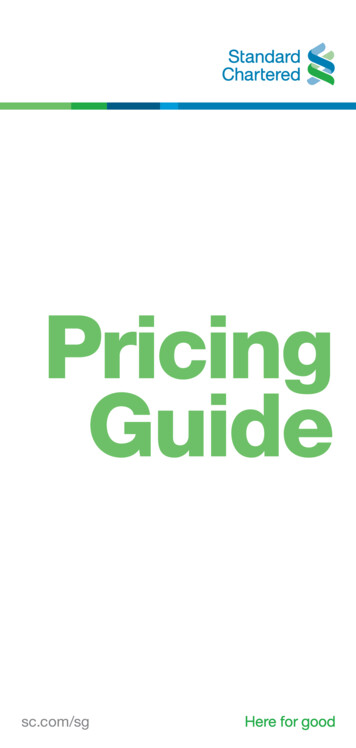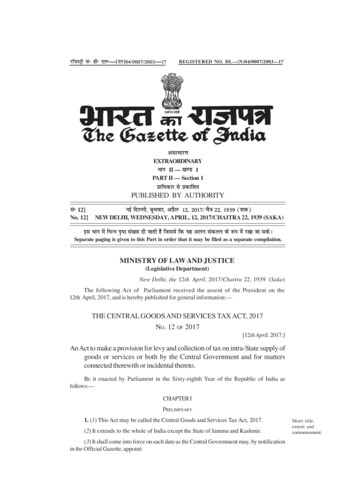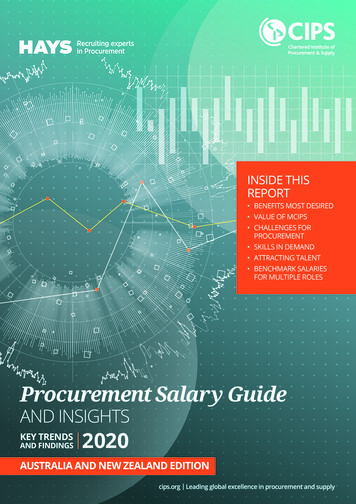
Transcription
INSIDE THISREPORT BENEFITS MOST DESIRED VALUE OF MCIPS CHALLENGES FORPROCUREMENT SKILLS IN DEMAND ATTRACTING TALENT BENCHMARK SALARIESFOR MULTIPLE ROLESProcurement Salary GuideAND INSIGHTSKEY TRENDSAND FINDINGS2020AUSTRALIA AND NEW ZEALAND EDITION
PROCUREMENT SALARYGUIDE AND INSIGHTS 2020As the latest insights are revealed about the profession, there have beensome successes, but we must strive to become even betterAs you’ve picked up this year’s copy of theCIPS/Hays Salary Survey and report, you’vealready demonstrated your commitment todiscovering the value placed not only onyour skills in procurement and supply chainmanagement, but that of your teams andpeers. I would say there are some coreinsights here and a great deal of progresshas been made in our profession aseveryone strives to meet the challenges inthe 21st century. Though the data wascollected before the COVID-19 coronaviruspandemic, the results are still absorbing,especially now as supply chain disruptionswreak havoc and professionals are tested toprobably the greatest extent in their careers.Perhaps that’s why the top skill required bybusinesses from procurement and supplychain professionals in the private sectorespecially, was risk management. Riskencompasses many things – continuation ofsupply is just one, the most basic requirement,but we know that supply chain managersare now responsible for a whole lot more.Sustainability issues, protection fromcorporate reputational risk, eliminating slavesfrom a business’s supply chains, all haveto be the highest examples of not just riskmanagement but strong ethical procurement.As professionals we must show greater will,greater transparency, and what I call ethicsplus, to elevate the profession still further.Even without the pandemic, supply chainmanagers have had a lot to contend with overthe past year. The see saw of will we/won’t weleave the EU, and the US and China lockinghorns affecting global trade, gave financialmarkets the jitters and were just the tip ofthe iceberg of trials we all faced. But as onethreat recedes into the background, others arealways waiting in the wings to take their placeas recent experience has shown us. Ongoingconcerns around how trade negotiationswith the EU and the rest of the world will panout, as well as the human and economic costof the COVID-19 coronavirus are the newnormal. These challenges mean supply chainmanagers are always on their toes; always onthe lookout for the next threat and how tomitigate against it and always learning abouthow to improve their supply chains and theirown skills.With this backdrop and with the findings ofthe report, it’s obvious that this professionremains in high demand. When I startedin procurement, there were two goals –continuity of supply and value across thesupply chain. Now procurement and supplychain professionals must protect corporatereputation, create an environment for bestinvestment opportunities, increase innovation,grow the business and beat off competition,implement digitalisation and the maintenanceof sustainable supply chains. That soundslike a lot, and the necessary range of skillsboth technical and soft skills that are requiredcreate the professionals of choice eagerlysought by businesses large and small, anddevelops our professionals into potentially, theCEOs of the future.* atistics-income-june-2019-quarter** /salary-guide-australia-new-zealandThis year’s report found that 66% ofprofessionals said procurement was valuedat their organisation. Though a positivestatistic, I would like it to be higher. Havingthe right people in the right roles is crucial tothe success of every business and we must bemore vocal about the benefits of procurementand what as professionals we can do tosupport business goals.On a personal career level, procurement andsupply chain managers also excel. With anaverage pay rise of 4.6% across both Australiaand New Zealand compared to the nationalaverage of 2%* in New Zealand and 2.2%**in Australia, highlighting the rewards arethere for driven individuals. With 31% more inAustralia and 22% more in New Zealand forMCIPS professionals, this means that talentis also being recognised. Therefore, I wouldurge all our professionals to keep striving andkeep training and maintain their up-to-dateknowledge to become Chartered professionalsand prove those rewards are well-deserved.By demonstrating their relevance not only totheir peers, the businesses they work for, andeven the profession itself, the impact fromhighly-skilled professionals will be felt far andwide. Potentially, and collectively, we can makea difference to economies and even the publicgood; by being the best professionals, with thestrongest ethics and bringing transparencyand excellence to supply chains.Malcolm HarrisonGroup CEOChartered Institute ofProcurement & Supply
HIRING FOR THE FUTUREWe are pleased to partner with CIPS for a sixth year to continue to provide insight intothe key trends and issues impacting the procurement and supply chain profession.The events of the opening few months of2020 have been unprecedented leaving manyprofessionals and organisations to adapt to anew way of working and to rapidly changingsituations. One thing the COVID-19 crisishas allowed procurement and supply chainteams to demonstrate is just how invaluabletheir role is in keeping vital services acrossthe world afloat, including healthcare, socialcare and food supply chains to name just afew. As we enter into the new era of work, thisimportance will continue to develop.will be in the best position as we transitionto the other side of the pandemic. In termsof the skills in demand, change managementhas entered the list of top skills needed fora professional to perform their job well forthe first time this year. As has been madeapparent in the first few months of 2020,change is inevitable, so being adaptable tochange will likely become even more soughtafter within procurement. Professionalsshould therefore develop in this area tosucceed in the new world of work.In our ‘new normal’ world it’s been shownthat hiring and onboarding procurementprofessionals can continue in a virtual way, sowith skills shortages still being widespread,those employers who are carrying on withtheir recruitment plans to fill skills gaps nowWorking from home is one aspect ofworking life that has become decidedly morewidespread as a result of the COVID-19pandemic. Our guide shows that being ableto work from home is an important factor toprofessionals, so employers should use thisThis report is published as the Australian andNew Zealand economies emerge from thecoronavirus pandemic. While the initial phaseof the pandemic appears to have been verywell managed in the region, Australia and NewZealand cannot be isolated from the impactof the pandemic on the global economy. Thepandemic highlighted the risks that exist in thesupply chains of all organisations. Managingthat risk has, arguably, never been moreimportant, while the complexity of the taskfaced by procurement professionals has neverbeen greater.Unfortunately, the gender pay gap dividecontinues to be an issue. This disparity inmale and female earnings been discussed inprevious reports and is one that the professionmust now start to examine in greater depth;with a view to understanding why the gapexists and what can be done to eradicate it.With this emerging context, the CIPS/HaysProcurement Salary Guide and Insights 2020report clearly shows that in Australia andNew Zealand the demand for procurementprofessionals continues to be very strong. Withinthe profession there continues to be a significantsalary premium (31% Australia, 22% NewZealand) for MCIPS professionals as opposed tonon-MCIPS professionals. Furthermore, therewas a greater incidence of bonus payments forMCIPS qualified professionals.Digitalisation increasingly allows moreoperational and repetitive procurementtasks to be completed with greater speedand accuracy. This has increased the focus ofprocurement professionals on strategic andrisk management activities. The combinationof the environment in which procurementprofessionals are working and evolvingtechnologies is impacting the skills thatprocurement professionals are being askedto exhibit. There is much greater focus onthe soft skills of communication, relationshipmanagement, influencing and stakeholdermanagement. The development of thesesoft skills will be an increasingly importantcomponent of the future procurementprofessionals’ catalogue of competences. As aopportunity to see how they can maintainremote working capabilities going forward.The salary increases we are seeing in anumber of roles within the profession is anindicator of the high value that continues tobe placed on talented professionals, and wewould expect this trend to continue in thenext year as the procurement and supplyprofessions continue to play an importantrole during the COVID-19 crisis and beyond.We hope you find the insights covered in thisreport useful in your workforce planning, oras a guide for your own career development.Scott DanceDirector, Hays Procurement &Supply Chainresult, the need for training and developmentwill be critical to equip procurementprofessionals with these ‘future facing’competences. This report clearly illustrates thatprocurement professionals are aware of theneed for ‘professional development’ and arebeing attracted to those employers who offertraining and development as part of an overallbenefits package.At the start of this decade the challengefor procurement professionals is clear, arapidly changing business and technologicalenvironment requires new capabilities andcompetencies to be added to the procurementprofessional’s arsenal. The development ofthese capabilities combined with new ways andpatterns of working will be key drivers of theprofession in the next ten years.Dr. John GlenCIPS EconomistVisiting Fellow of Cranfield University 03
ABOUT THIS REPORTThe CIPS/Hays Procurement Salary Guide and Insights2020 allows procurement professionals and employers to: Evaluate the perceptions of procurementBenchmark salaries and bonuses for different rolesHighlight career aspirationsGain insights on how to attract, retain and develop talentThis report is also availablefor the following regions:United KingdomMENASouth AfricaSub-Saharan AfricaNorth AmericaThe data was collected prior to the COVID-19 outbreak, however, we hope the information contained in this guide still provides usefulinsights when hiring or taking the next step in your career during this extremely busy time for procurement professionals. We willcontinue to monitor the impact of COVID-19 in next year’s 2021 report.THE REPORT IS DIVIDEDINTO SECTIONS:1 Procurement – Perceptions,challenges, skills andopportunities2 Salaries, bonuses and benefits3 Talent managementCONCLUSIONCOMPETENCY LEVELAdvanced ProfessionalProfessionalWithin each section we have set out thestatistical findings of our survey alongsideconclusions drawn by the experts involvedin putting together the report, plus linksto useful information and resources thatfurther support the points discussed.The findings in this report are based onresearch conducted in September 2019 via anonline survey among professionals currentlyworking in procurement. This year over 5135professionals globally completed the survey.The results were analysed by the ProfessionalAssociations Research Network (PARN).The data in all graphs is based on 2020respondents only and is not a comparisonon 2019 data. However, we have highlightedsignificant year on year changes.Statistics throughout this report have beenrounded to the nearest decimal point.Throughout this report different levels ofprofessional seniority have beensummarised into five levels of competency.These are described in the chart belowalong with some examples of job rolesthat fall into each group.TYPICAL JOB ROLESHead of Procurement, Procurement Director, Commercial Director,Chief Procurement Officer, Supply Chain Director, Head of Sourcing.Procurement Manager, Purchasing Manager, Senior Category Manager,Supply Chain Manager, Strategic Procurement Manager, Operations Manager,Commercial Manager, Head of Logistics.ManagerialSenior Buyer, Category Manager, Contracts Manager, Contracts Officer,Logistics Manager, Supply Chain Executive.OperationalBuyer, Procurement Specialist, Supply Chain Analyst, Procurement Executive,Procurement Officer, Supply Chain Planner, Logistics Analyst.TacticalPurchasing Assistant, Assistant Buyer, Administrative Assistant, Stock Controller,Contracts Administrator, Inventory Planner, Assistant Contracts d
AUSTRALIA ANDNEW ZEALAND95%see technology asan enabler to createopportunities forprocurementThe procurement and supply chain professionhas evolved at a rapid pace and now offers amore interesting and rewarding career thanever before.Today’s professionals are seen not only as buyers, but as enablers,business partners and strategic leaders who understand businessneeds are core to the success of their organisation, and who arealigned with the social responsibility and ethics agenda.The social, political and economic environment in which organisationsare operating is increasingly more complex, which has beencompounded in recent months by the COVID-19 global pandemic.On top of this, the digital evolution is placing greater demands onprocurement and supply chain management. Business leaders areprogressively turning to procurement for solutions to reduce risks andfind new opportunities. In fact, risk mitigation – whether continuity ofsupply, reputational risk caused by ethical and environmental issues, orensuring the sustainability of sources of critical products and services –is fast becoming the prime focus of modern procurement.At the heart of this are value, ethics and sustainability, which should runthrough every aspect of procurement. Procurement and supply chainprofessionals need to strategically position themselves as championsfor change, promoting the highest standards of ethical practice for theirorganisations and supply chains. Modern slavery is a perfect exampleof how procurement professionals, by ensuring more transparentsupply chains, can step in and not only help to safeguard the reputationand longevity of their organisations, but also make a difference topeople’s lives.Procurement is growing ever-more important, valued, interesting andrewarding as a career. And so, it is perhaps no surprise that we areseeing an influx of new talent entering the profession. In fact, 59% ofour respondents – a much higher proportion than expected – statedthat they had made a conscious decision to work in procurement,which is a marked difference to years gone by when professionals saidthey ‘fell’ into procurement. It is a particularly exciting career choicefor young professionals who are attracted by the potential to hit theground running from day one, manage large budgets, and managesupplier contracts that can make a real difference to people’s lives,economies and society as a whole.In the fourth Industrial Age with its core focus on digital initiatives,we are starting to see more automation of procurement processes,which will continue to evolve. In fact, 69% of our respondents expecttechnology to replace some or all of their tactical sourcing decisionsin the future. This is not seen as a negative trend, since 95% of ourrespondents see technology as an enabler to create opportunitiesfor procurement. For example, automation helps to reduce or evenremove human error, and means that soft skills will become even morecritical, which means procurement professionals will be freed fromrepetitive, time-intensive tasks and will be able to focus on strategicactivities that can positively impact business outcomes.The picture our report paints of the value placed on strongprocurement and supply management is largely positive but there arestill some challenges. Primarily, these centre on internal issues suchas not being seen as a business partner or not being engaged fromthe start of a project. In reality, gaining competitive advantage throughstrategic sourcing, efficiencies and effective risk management are realvalue-adding activities, and so business leaders are increasingly lookingfor procurement professionals who are able to deliver these outcomesand ultimately enhance the overall business performance.Sharon MorrisCIPS General Manager – Australia and New Zealandfile-spreadsheetbinocularsbinocularsCIPS TipsReport: Digitalisation in ProcurementGuidance: Soft SkillsGuidance: Stakeholder ManagementbinocularsGuidance: How to become an effective storytellerbinocularsGuidance: Change ManagementIt has also become easier to move from other professions intoprocurement roles, as organisations continue to place a strongeremphasis on recruiting for soft skills. Technical skills and qualificationsare an important foundation for procurement roles, but they can belearned on the job and so abilities such as communication, influencingand internal stakeholder management have become more highlysought after. As procurement and supply chain managers develop theirskills, we are also seeing more individuals move into more generalistroles with some making their way to the very top. 05
HOWPROCUREMENTIS VIEWED73%AGREEPERCEPTION OFPROCUREMENTHAS IMPROVEDin thelast 12monthsProcurement has evolved to a large extentover the last two decades to become morecentral to the success of organisations. Today’sprofessionals have a wider remit, require broaderskills and experiences, and are becomingever-more sought after as business challengesincrease in number and complexity. This has beeneven more true during the COVID-19 outbreak,where procurement professionals have playeda key role in helping to keep frontline services,from healthcare through to supermarkets,supplied with the assets they need to support thecommunity. From embedding innovation throughdigital disruption and proactively embracing thesustainability agenda, to shaping and developingnew supply markets or improving the widercommunity and economies through a focus onsocial value, there is no doubt that procurementand supply chain professionals are making a realdifference to customers, colleagues, society andother stakeholders.Although this year’s perception of procurementand supply management is largely positive, with73% of respondents agreeing that the perceptionof procurement has improved within theirorganisation, we should not be complacent. Thereis still crucial work to do in terms of influencingkey internal stakeholders and senior businessleaders if procurement is to gain the recognitionit deserves as a critical business discipline on parwith other well-regarded departments.HOW PROCUREMENT IS VIEWEDPerception of procurement hasimproved in the last 12 months73%Procurement is very muchvalued within my organisation66%Directors and Heads of otherdepartments in my organisationunderstand what procurementspecialists can offer66%Staff in other departments inmy organisation understandwhat procurementspecialists can offerProcurement is engaged fromthe start of a project55%49%It’s certainly true that procurement has evolved andis now increasingly viewed as a strategic partner to abusiness. In the conversations we have with employersand procurement professionals, it’s clear that today’sprocurement and supply chain leaders operate in a worldof continuous change. Procurement has transitionedfrom a tactical to a strategic function, with procurementprofessionals now able to contribute to overall businessefficiency and competitiveness and directly impact thebottom line. This creates quality opportunities for thoseentering the profession or looking to advance their career.To take advantage, look for opportunities in your currentor next role where you can gain commercial acumen,learn stakeholder engagement skills, develop yourpeople management skills and display your proactive andcollaborative nature. Be ethical, work hard and drive thesustainability agenda. In this way, you’ll be able to showyou have what’s required to engage with a business and itsstakeholders to drive positive change.Tim James – Hays AustraliaAdam Shapley – Hays New ZealandmicrophonemicrophoneCIPS TipsPodcast: Behavioural ProcurementPodcast: Procurement must lead rather than being ledtoolbox Tools: Soft Skills and Communication Toolstoolbox Tools: Stakeholder Identification and Management Toolsnewspaper Guide: The DNA of a CPO AU guide NZ guidecips.org/salary-guide-australia-new-zealand
KEYCHALLENGESExcluding the impacts of COVID-19 onorganisations, our findings show that,once again, internal challenges dominate,reinforcing the importance of securingstrategic and operational buy-in andengagement with stakeholders as a priorityfor professionals. Procurement must bechampioned as a strategic enabler at thevery highest levels of an organisation andbe fully appraised of strategic objectivesto deliver against senior leadership’sexpectations, demonstrating real value.65%STATEDBEING SEEN ASA STRATEGICPARTNER TO THEBUSINESSIn organisations where procurement isseen as a strategic partner, the function islikely to be engaged at the earliest stages ofidentifying business goals, such as supplychain sustainability, cost savings and digitalasthe topchallengetransformation. Many organisations arecoming to realise that to play a part inachieving these corporate goals, procurementmust be involved at the beginning.Managing risk in the supply chain is alsoidentified as a key challenge. Risk mitigation- whether it is to achieve security of supply,prevent reputational risk caused by ethicaland environmental issues, or ensure thesustainability of sources of critical productsand services - should be the prime focusfor procurement and supply. Procurementprofessionals must focus on increasingtransparency across their supply chains,increasingly traceability and proactivelymanaging and mitigating risks across theirsupply chain.TOP SIX CHALLENGESBeing seen as a strategic partner to the business65%Ensuring engagement with procurement at the outset of a project55%Managing risk in supply chain41%Attracting staff with the right skillsInvesting in the right technologyBeing recognised within the organisation for savings madetoolboxtoolboxbinoculars36%33%29%CIPS TipsTool: CIPS Risk ToolkitTool: CIPS Risk and Resilience Assessment ModelGuidance: Risk Analysis and Management 07
IMPORTANCEOF KEY SKILLSTOP FIVE SKILLS IN DEMAND BY JOB LEVELKEYSoft skillsTechnical skills ADVANCED PROFESSIONALInfluencing Skills89%LeadershipCOMMUNICATION,INFLUENCING ANDINTERNAL STAKEHOLDERMANAGEMENTIMPORTANTAT ALL LEVELS84%Change Management80%Communication79%Internal Stakeholder Management79%PROFESSIONALInfluencing Skills92%CommunicationThe perception of procurement is changing across all sectorsas it continues to be viewed as a more strategic activity anda critical lever in achieving organisational objectives. Aswe have highlighted earlier in this report, this means thedemands on today’s procurement professionals are morecomplex and have increased in number. This brings bothopportunities and challenges for procurement and supplychain managers if they are abreast of the latest thinking,and while technical skills are well understood, the skills fortoday’s successful procurement professionals have much incommon with those of a business leader.Consequently, we have seen a year-on-year increase inthe importance of soft skills at every level, which continueto dominate the top five in our list of skills in demand andare seen as very important by procurement professionalsfor performing in their role. This year, communication,influencing and internal stakeholder management wereidentified within the top five skills in demand at all levels,while leadership skills were also of most importancefor senior professionals which have also increased inimportance during the COVID-19 crisis. These skills are allcritical to achieving cost-effective and strategically soundprocurement solutions. Trained professionals know thisincludes creating a business case, securing buy-in frominternal stakeholders, pre-empting challenges and sourcingthe right suppliers, developing relationships and managingcontracts effectively.Of course, technical skills are still valued and this yearwe see change management in the top ten skills for thefirst time. Traditionally, dealing with change was taskedto a tactical function but more and more, organisationsappreciate the limitations of this approach which maystem from a lack of skills and experience, a lack of time toimplement change or not enough information available forthe change programme. Business leaders therefore seechange management as a distinct and strategic skill whichrequires departmental and senior level buy-in, the rightsupport and the right systems in place. However, as well asrequiring technical knowledge, effective change managersmust also possess all the soft skills listed here and so thiscannot be seen as a standalone aland88%Internal Stakeholder Management79%Supplier Relationship Influencing Skills82%Communication77%Internal Stakeholder Management75%Supplier Relationship n73%Influencing Skills72%Internal Stakeholder Management68%Supplier Relationship Management65%TACTICALCommunication70%Supplier Relationship ManagementInfluencing SkillsData Analysis/Business IntelligenceNegotiationwebcam67%63%59%56%CIPS TipsWebinar: Influencing the C-Suitebook-reader Top 10 tips for influencing internal stakeholderstoolbox Tool: CIPS Global StandardmicrophonemicrophonePodcast: Procurement must enhance their soft skills toincrease their influencePodcast: Procurement must lead instead of being led
SALARIES4.6%AVERAGEPROCUREMENTPROFESSIONALPAY RISEboth inAustraliaand NewZealandAVERAGE SALARY FOR ALLPROCUREMENT AND SUPPLYPROFESSIONALSAUD 141,218NZD 123,191As previously noted, this data was collectedbefore COVID-19. The data showed that,at that time, the average salary increasefor procurement professionals thisyear is 4.6% across both Australia andNew Zealand compared to the nationalaverage of 2%* in New Zealand and2.2%** in Australia. While salary increaseexpectations are now very differentacross all industries and professions, thisresult paints a very positive picture forprocurement as a profession that is highlyregarded and remunerated.level, while in New Zealand the largestpay gap is at Operational level (15%) andthe narrowest is at Managerial level (2%).There has been a considerable reductionin the gender gap, from 31% over thelast year, however organisations havemuch work to do in order to face up toand proactively address this issue; formen and women alike, salary is the mostimportant issue when considering movingto a new employer and so in order toretain talented women in the professiongender pay equality must be addressed.As expected, those at more advancedlevels of seniority earn higher salaries andremuneration is highest in the PrivateSector across all levels. However, theresults also show the Public Sector isseeking to win talent back from thePrivate Sector.However, although salary will alwaysbe an important aspect for employersto get right to attract professionalsto a role, it should not be viewed inisolation. Not every organisation willbe able to compete for talent throughpay – particularly now when budgets aretight – and therefore the entire packageon offer to professionals, from benefitsand continued flexible working optionsthrough to the variety of the role, mustalso be considered and promoted toprospective job candidates.In both countries, a gender pay gap is stillnoticeable at every level, despite a hugeimprovement on last year. In Australia,the largest disparity is at AdvancedProfessional (13%) and Operational (18%)I cannot think of a time where procurement has been so vital fororganisations – more so with the disruptions we have experienced inrecent months. The opportunity to impact business performance andmake a difference for the environment and the community is huge.With this, comes the need to further develop soft skillsets such ascommunication and influencing, to support greater responsibilities. Andthe reward – both salary and career progression – is quite enticing.Sharon MorrisCIPS General Manager – Australia and New ZealandtoolboxwebcamCIPS TipsTool: Interactive global salary mapWebinar: Diversity and inclusion with Rio Tinto* stats.govt.nz/information-releases/labour- market-statistics-income-june-2019-quarter** tradingeconomics.com/australia/wage-growth09
SALARIES – AUSTRALIAAVERAGE SALARIES BY LEVEL OF SENIORITY AND GENDER - AUSTRALIAKEYFemaleMaleADVANCED PROFESSIONAL AUD 23.0k 13%196,200173,242PROFESSIONAL156,942 AUD 9.5k 6%147,408MANAGERIAL AUD 5.5k 4%137,500132,037OPERATIONAL AUD 17.6k 18%117,933100,326TACTICAL88,111 AUD 2.2k 3%85,942020406080100120140160180200000s AUDAVERAGE SALARIES BY GENDERKEYFemaleMale150,660 17.6%128,166020406080100120140160000s AUDSALARY BY REGIONVictoria and Tasmania combined135,798Australian Capital Territory andNew South Wales combinedSouth Australia andNorthern Territory combined156,603146,791Queensland116,745Western Australia149,691406080100000s 40160
INCIDENCE OF RECEIVING A PAY RISE IN THE LAST 12 MONTHS BY REGION75%68%71%Victoria andTasmaniacombinedAustralian CapitalTerritory andNew South WalescombinedSouth Australiaand NorthernTerritorycombinedAverage pay rise as %4.3%Average pay rise as %4.3%Average pay rise as %4.4%66%66%QueenslandWesternAustraliaAverage pay rise as %5.6%Average pay rise as %4.2%2020 is a year that will be long remembered. In just a few short weeks, the world aswe knew it
PROCUREMENT SALARY GUIDE AND INSIGHTS 2020 As the latest insights are revealed about the profession, there have been some successes, but we must strive to become even better As you've picked up this year's copy of the CIPS/Hays Salary Survey and report, you've already demonstrated your commitment to discovering the value placed not only on

